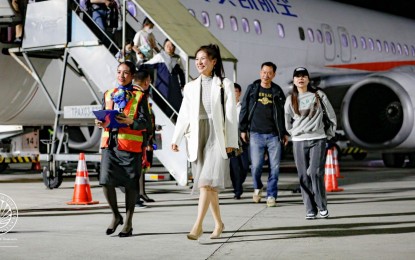
CHINESE TOURISTS. Chinese tourists alight from the plane upon arrival in Kalibo town, Aklan province in this photo taken in April 2023. Leechiu Hotels, Tourism, and Leisure Director Alfred Lay on Wednesday (Aug. 14, 2024) said the ban on all Philippine offshore gaming operators should open doors for talks to ease visa restrictions for the Chinese tourists. (Photo courtesy of DOT)
MANILA – The ban on all Philippine offshore gaming operators (POGO) should open doors for talks to ease visa restrictions for the Chinese tourists, a tourism and hospitality expert said Wednesday.
On the sidelines of the Hotel Sales and Marketing Association (HSMA) general membership meeting in Manila, Alfred Lay, Leechiu Hotels, Tourism, and Leisure Director, said China remains an important market that the Philippines must strive to recapture in the long run.
“It’s not just the visa but the visa is one of several impediments for the Chinese tourists to come here. They have also stricter currency outgoing capital flows and that’s not only related to the Philippines but also to our neighboring countries,” he told the Philippine News Agency.
“But the more we can remove the barriers, the ease of travel to the Philippines will improve and that’s the overall aim,” he added.
Lay believes the imposition of stricter visa rules on Chinese nationals were made mostly due to concerns that they are using tourist visa “as a way of entering the Philippines to then join the POGO market”.
“Once the closure of all the POGOs has happened, the government can consider easing visa restrictions for Chinese arrivals, which will put us on par with our Southeast Asian neighbors and allow us to attract more Chinese visitors,” he said.
The Department of Tourism (DOT) earlier disclosed that it will “recalibrate” efforts to boost arrivals from other source markets, including South Korea, the United States and Japan amid the slow return of Chinese tourists.
Lay agreed that recalibration is a good move and suggests the Philippines to look at source markets it can grow quickly such as the Middle East, Hong Kong, Singapore, Vietnam, Malaysia, and India.
“But in the long-term, China has to be a significant part of our tourism picture,” he said.
“Our top source markets are always where you should look because there's already an existing link between those countries and it's easier to grow an existing base than to start new source markets,” he added.
While these would not fully compensate for the Chinese tourists in the short term, Lay said a "diversified mix" of markets is still a huge advantage for the Philippines.
“An interesting market would be the Middle East because we already have existing flights. All the major Middle Eastern carriers fly into Clark, Ninoy Aquino International Airport, Cebu, and even Davao,” he said.
“They're familiar with our people— so the connection is there. If we can promote to those markets, they can find reasons and interests to come to the Philippines,” he added.
The DOT targets to reach 7.7 million in arrivals by the end of 2024. Since the start of the year, the Philippines has so far recorded at least 3.55 million in international visitors. (PNA)
